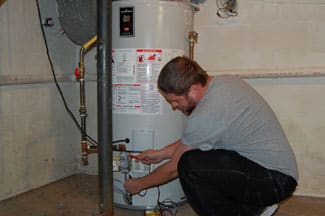We have noticed this post pertaining to Water Heaters Problems directly below on the net and decided it made perfect sense to share it with you on this page.

Envision beginning your day without your routine warm shower. That currently sets a bad tone for the rest of your day.
Every house requires a reliable hot water heater, but just a few know how to manage one. One very easy method to maintain your water heater in leading shape is to look for faults consistently as well as repair them as soon as they show up.
Remember to shut off your water heater before smelling around for mistakes. These are the hot water heater faults you are more than likely to experience.
Water as well warm or also cold
Every hot water heater has a thermostat that determines exactly how hot the water obtains. If the water entering into your house is too hot in spite of setting a convenient maximum temperature, your thermostat may be malfunctioning.
On the other hand, as well cold water might be because of a stopped working thermostat, a damaged circuit, or incorrect gas circulation. As an example, if you utilize a gas water heater with a busted pilot light, you would get cold water, even if the thermostat remains in ideal problem. For electric heating units, a blown fuse may be the perpetrator.
Insufficient warm water
Water heaters been available in several sizes, depending upon your warm water demands. If you run out of warm water prior to everybody has actually had a bathroom, your hot water heater is too small for your family size. You must consider setting up a bigger water heater storage tank or selecting a tankless water heater, which takes up less area and also is much more durable.
Odd noises
There are at least 5 sort of noises you can hear from a hot water heater, but the most typical analysis is that it's time for the hot water heater to retire.
First off, you should be familiar with the normal sounds a water heater makes. An electric heater may seem different from a gas-powered one.
Popping or banging sounds typically mean there is a slab of debris in your containers, as well as it's time to cleanse it out. On the other hand, whistling or hissing sounds may merely be your valves letting some stress off.
Water leaks
Leaks can come from pipelines, water links, shutoffs, or in the worst-case scenario, the container itself. Gradually, water will wear away the storage tank, and discover its way out. If this occurs, you need to change your water heater immediately.
Nonetheless, before your modification your entire container, be sure that all pipes are in area which each shutoff functions flawlessly. If you still require help identifying a leak, call your plumber.
Rust-colored water
Rust-colored water indicates among your hot water heater parts is corroded. It could be the anode rod, or the tank itself. Your plumber will certainly have the ability to recognize which it is.
Warm water
Despite just how high you established the thermostat, you will not obtain any type of hot water out of a heating unit well past its prime. A water heater's effectiveness may decrease with time.
You will also obtain warm water if your pipes have a cross connection. This means that when you activate a tap, hot water from the heating system moves in alongside normal, cold water. A cross connection is easy to place. If your hot water taps still follow shutting the hot water heater valves, you have a cross link.
Discoloured Water
Rust is a significant root cause of filthy or discoloured water. Corrosion within the water storage tank or a failing anode pole can cause this discolouration. The anode rod safeguards the container from rusting on the inside and also must be checked yearly. Without a pole or a correctly operating anode rod, the hot water promptly corrodes inside the storage tank. Get in touch with a specialist water heater service technician to determine if replacing the anode rod will take care of the trouble; otherwise, change your hot water heater.
Final thought
Preferably, your hot water heater can last one decade prior to you require an adjustment. Nonetheless, after the 10-year mark, you might experience any one of these mistakes a lot more regularly. At this point, you ought to add a new hot water heater to your spending plan.
How To Troubleshoot 3 Common Water Heater Problems in Twin Cities
The Water Heater Is Leaking
A leaky cold water inlet valve A loose pipe fitting A leaky temperature and pressure relief valve A corroded anode rod A cracked tank Turn Off Your Water Heater:
Shut off your gas water heater by turning the gas valve on the unit to the “OFF” position. Shut off your electric water by switching its power off at your electrical panel. Look for a two-pole breaker labeled “water heater” and turn it to the “OFF” position. Move the ball valve connected to the water heater to be perpendicular to the piping at a 90° angle. Look for the Leak:
Depending on whether the water is coming from the tank's top or bottom, you’ll want to look for the leak in different locations.
If the leak comes from the top of the tank, carefully look for water escaping from the cold water inlet valve or loose pipe fittings. Rusted hot and cold water valves can have loose connections with the tank, with water leaking out of them.
https://mspplumbingheatingair.com/blog/how-to-troubleshoot-3-common-water-heater-problems
Do you like more info about Common Problems with Your Home Water Heater? Give a comment below. We'd be glad to see your thoughts about this entry. We hope that you visit us again later on. Are you aware of somebody who is curious about Water Heater Repair and Troubleshooting? Take a moment to promote it. Kudos for your time. Please visit our blog back soon.
Emergency? Dial immediately.